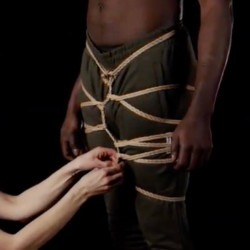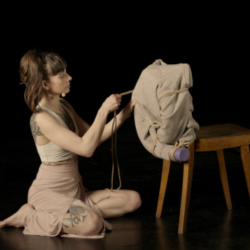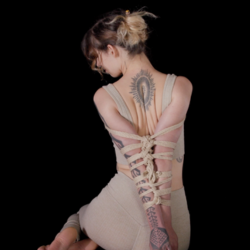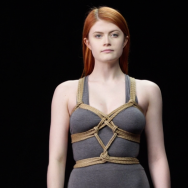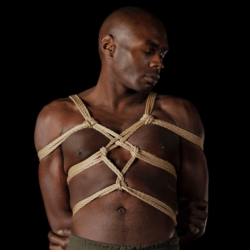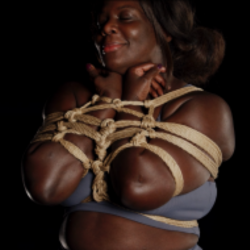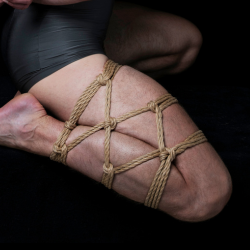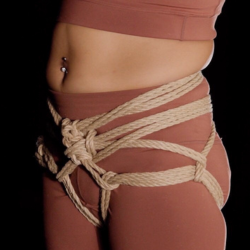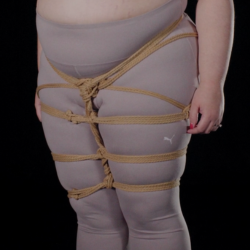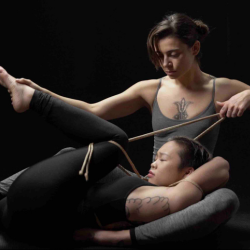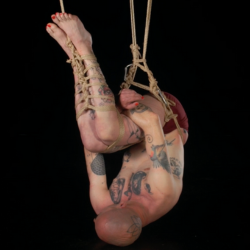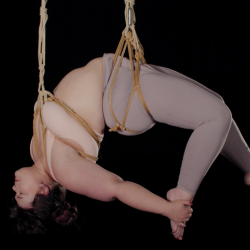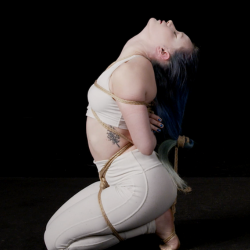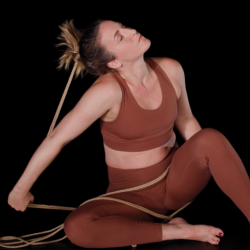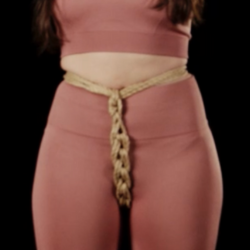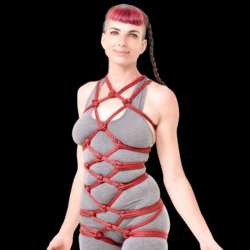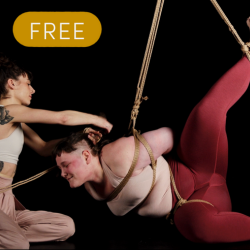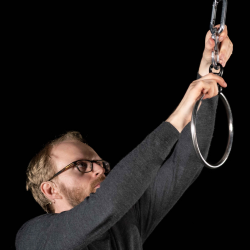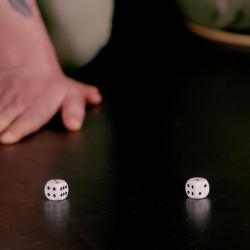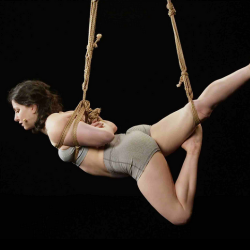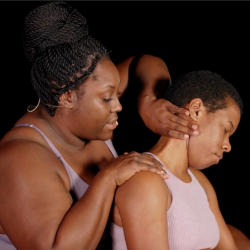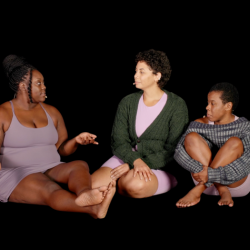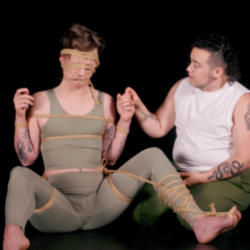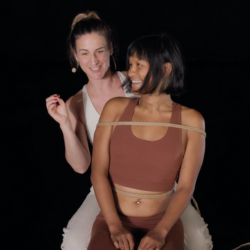EP 51
DUAL DEMONS
Devon and Cass discuss their evolving experiences with rope bondage, chronic pain, and navigating personal trauma. They explore communication, consent, and collaboration in kink, offering insights into how pain and power dynamics shape their connection both on and off stage.

Dual Demons are two non-binary, trauma-informed BDSM + kink educators and performers specializing in rope suspension and the development of Queer, anarchist spaces. Devon (they/them) and Cass (they/she) are two silly little chaos gremlins based in Santa Cruz, California. They fundamentally believe in the dichotomy of kink through finding Queer joy and silliness while simultaneously curating an intimate, sadomasochistic experience.
Instagram: @dual_demons
[00:00:08] Wren Greetings to all my guys, gals and non-binary pals. Welcome to the Shibari Study Podcast. I'm your host, Wicked Wren. Shibari Study is an online learning resource offering video tutorials for beginners through advanced practitioners. Whether you're brand new to the world of Shibari and needing to learn the basics, or a seasoned rigger or rope bottom seeking inspiration to push your practice to new places, there's something for you at shibaristudy.com. Today, I'm talking to Devon and Cass of Dual Demons. Devon uses they/them pronouns and Cass uses they/she pronouns. They're both two trauma informed, (…) little guys. Can't wait to talk to you two. How are you?
[00:00:52] Cass Good.
[00:00:53] Devon Wonderful.
[00:00:54] Wren Amazing. So not to get off super heavy here, but a fascinating fact about you, Cass, is that you were a climate ecologist, correct?
[00:01:08] Cass I am, yes.
[00:01:10] Wren Are. Sorry. Currently in the trenches.
[00:01:13] Cass You know, I, I haven't done like, actual experiments. Like, I'm a marine biologist by trade. And my focus is climate change ecology. But it has been a while since I've, like, been actually in the trenches of, like, diving and down running experiments and taking care of other little guys like snails and urchins and things.
[00:01:41] Wren Real little guys.
[00:01:43] Cass Real little guys. Yeah.
[00:01:45] Wren I feel like every kid growing up wants to be a marine biologist.
[00:01:50] Cass Yeah. I mean, me too. Like, I spent a lot of time at the beach. I grew up in Southern California, and so, like, my safe haven was the beach. I used to go out and, like, on a paddle board and, like, go past the break, and I'd have a plastic baggy full of, like, little flashcards that I put, like, study like leg out on the paddleboard. Cuz it was just like a good, quiet little place.
[00:02:17] Wren That's the cutest story I've ever heard in my life. That's adorable. Devon, where did you grow up?
[00:02:25] Devon I grew up in Salinas, so kind of like Central California.
[00:02:30] Wren Yeah, I've heard of it.
[00:02:31] Devon And then in small towns around California.
[00:02:34] Wren Well, how did you two meet?
[00:02:37] Devon We met on Field, which is like a little dating app for (…) and (…) people and... And just we're like, so we're best friends out and...
[00:02:49] Cass Yeah.
[00:02:50] Devon For a while, for the next few months, how we're going to hang out.
[00:02:53] Cass This is incredible. Yeah. We, like, what, got coffee and then we're like you – yeah? Yeah!
[00:03:02] Wren Were you two... Obviously you two were both (…) before you met. And you two were both into the rope world and all that kind of stuff?
[00:03:12] Devon Not really. Actually, Cass was one of the first people who I ever tied with and totally, like, opened up my world to rope, in a way that I had not seen before.
[00:03:23] Wren That's cool. You two are both switches, right?
[00:03:26] Devon Yeah.
[00:03:27] Cass Very much so, yeah. I have this, this insane, but I love it, it's like... I am a... Non-binary, bisexual relationship, anarchist switch and I have never made a decision in my life.
[00:03:48] Wren We keep it options open here, people.
[00:03:50] Cass Yeah, exactly. I want to do all of the things all of the time.
[00:03:57] Wren Does anarchy play a role in this?
[00:04:00] Devon I think largely for me it does. I think during Covid I was radicalized a lot, in a lot of ways and saw the world like kind of more as it is and unpacked a lot of interpersonal boxes for myself and really kind of looked at gender in a way that was not accessible to me growing up and was not talked about in, I grew up in really small, like religious towns, and that, that wasn't even something I'd even heard about before I moved to Santa Cruz, which is like a much more liberal town in California. Yeah. And I heard about, like, people using they/them pronouns and it just fully clicked for me that –
[00:04:45] Wren Cass, was that kind of the same for you or different or...? You don't have to talk about that, by the way, if you don't want to.
[00:04:51] Cass Yeah. No, we talk about it all the time and it's something that we are like very open about. And yeah, I just love opening space for people to be able to have that too. Yeah, I, I also had that like queer awakening that happens during lockdown. A lot of like time to think and time to just like, oh (…), who am I?
[00:05:17] Wren Do you think it's because everything slowed down for a bit?
[00:05:22] Cass I don't know if it's slowed down more than just like everything was like, just thrown into unknown and chaos and like, if, you know, if this is going to be our lives and like, you know, in some ways, if our known world is ending, then like, who do we want to be? And if we could be anything but like, we're going to figure out what that is for our true selves and then like, live in that truth.
[00:05:49] Wren I love that... Do you feel like that impacted how you approach (…) and rope in your relationship, and what you want to get out of rope together?
[00:06:01] Cass I think. Absolutely. Yeah.
[00:06:04] Wren What do you two enjoy in rope together? What does success look like in a rope scene between you two?
[00:06:13] Devon I think for me, it's like how many giggles that we had and, like, how many times Cass has told me to (…) off. And I think, I think that, like, that's a good liveness test of of, like, how much fun that we've had is like the interaction in the way that we like, talk throughout and negotiate throughout and just like, yeah, how we can kind of connect better in rope.
[00:06:41] Wren It begs the question, what do you do for Cass to say (…) off?
[00:06:46] Devon Oh my God...
[00:06:47] Cass They do such (…) up things. It is like an indication, like if I am quiet or if I am like speaking in like more plain language, that like that is where you know, we are on the edge or like, you know, having some sort of like difficulty or problem. But if I'm like just swearing, just like, You suck so much, I'd like, try to get out of the rope or like kick or punch them or something or bite them. I'm just like a huge brat.
[00:07:16] Wren I love that. That's really cute. How often do you two switch the tying relationship? Is it like 50/50 or is it skewed some other way? Or the topping relationship, the top/bottom relationship?
[00:07:33] Devon I would say like for performances. 70% of the time I top.
[00:07:40] Cass It feels like way more than that. I feel like it's like a default of like 90/10.
[00:07:46] Devon That could be true. Yeah.
[00:07:48] Wren Well, we actually have a fact checker. We have the exact metrics.
[00:07:54] Cass I was like, really?
[00:07:56] Wren No, no.
[00:07:57] Devon I went through all your performances, and actually...
[00:08:02] Cass I was like, we've done some really underground performances. I don't know how you got a hold of those, but I would like to see the pictures, please.
[00:08:09] Wren Our research team knows no limits.
[00:08:14] Cass I'm into it.
[00:08:15] Wren I love it. Is performance very different than personal play for you two?
[00:08:23] Devon I don't think so, because I think largely we try to go on stage and just, like, have a scene and we plan like a little bit ahead of time. But largely we just like try to work with our bodies and where they're at and where our brains are at and just like, show up and have a good time together. Would you say that's true too, Cass?
[00:08:46] Cass Absolutely. Yeah. It's just, like, so hard for us to be able to do what, like, Shay does in which, like, every single second and movement is, like, rehearsed so many times, like, like that is just not accessible for us. And like, especially for me, since I'm, like, bottoming most of the time.
[00:09:07] Wren Yeah. I think setting the bar at Shay is... Going to make anybody feel like they're not doing enough.
[00:09:16] Cass It's just different. Like we work with Shay a lot, and it's like our, our rope is just like so much different. And like, this is what we try to impart on people too is like, all rope is valid and it can look like whatever you want it to look like as long as everyone you know is consenting and they're safe and no one is like coming out of it, you know, injured.
[00:09:39] Wren If there was a feeling you wanted people to leave after watching you two tie, what would that feeling be?
[00:09:45] Devon That they feel gay.
[00:09:49] Cass Gay panic.
[00:09:50] Devon Yeah, we love some gay panic.
[00:09:53] Wren Is this the agenda that we hear about?
[00:09:55] Cass This is, this is the gay agenda, actually.
[00:09:58] Wren Oh my God.
[00:09:59] Cass We are the queer coded villains of your wildest nightmares. And this is the gay agenda. You're welcome.
[00:10:08] Wren [00:10:08]"The queer coded villains of rope." [1.9s] Pretty great tagline. So we need to use that.
[00:10:17] Cass Yeah. We actually, so we produce shows like variety shows in Santa Cruz and, like, that's one of the bigger things that we do. And the last show that we did was, called the Gay Agenda, and it was a queer coded villains variety show.
[00:10:36] Wren What is in these variety shows? Are they (…) focused?
[00:10:41] Cass They are... They definitely have (…) elements to it because like, it can't be a Dual Demons, like, show or events and not be (…) in some way because that is just inherently who we are. And the same way that like, everything is also like super silly. But we have like pole and rope and drag and burlesque and aerial arts and whatever weird thing that we can pull from the shadows to bring out. And I think that's like, really... That's the focus of our shows is, it is always a, an all queer cast because we are trying to, you know, uplift our community and like those performers, and really focus on like, giving opportunity to folks and to like, especially like marginalized communities, like using our power and privilege for community care.
[00:11:47] Wren In producing shows... Is there anything that stands out that is really important that you didn't realize was important in the beginning?
[00:11:58] Devon I'm not sure that we didn't realize this, but it's something that is, like profoundly important to us is like making sure that people get paid well, because I think, like a lot of performers get paid, like maybe $20, $50 and like a slap on the back and are like, Yeah, good, good job. And so we really tried to pay a really heavy sum, and we take very little ourselves so that, like, performers actually get a reasonable income from, from our shows. That's really important to us is like redistributing funds back into to queer people's pockets in our community.
[00:12:38] Wren You were talking about trauma informed (…). And Devon, you were saying, that has a lot to do with your job. And I would love just hear you talk about that. First off, what is trauma informed (…)?
[00:12:52] Devon Yeah, I think it's just asking questions of the people that we're around and like how they show up in the world and what activations could possibly come up for them. And like, not necessarily needing every single detail of someone's trauma to just respect and understand that there are things that make them feel uncomfortable or that they need, like, especially for aftercare or things like that, making sure that like, we're having those conversations ahead of time and that there's no, like, judgment for people who are having a hard time or potentially like, can't engage in (…) in the ways that they want to because of trauma and, and things that have come up for them.
[00:13:36] Wren That makes sense. How has your journey changed or your journey changed, either one of you over the years, like knowing about trauma? Have you made any changes in how you approach tying with other people or interacting with other people?
[00:13:54] Cass It is a constantly changing and evolving thing in that we are – we have this beginner mindset about everything and like we are always open to learning and growing and to understanding things about ourselves and the people that we surround ourselves and like our community better. Yeah, and we teach this class that is like the first class of our beginner series that feels super important to us. You want to talk about it?
[00:14:26] Devon Yeah. It's just like a negotiation and consent class. And a part of the questions that we have listed out for people on the negotiations list is just like 10 or 15 questions about trauma. And really trying to let people know that that's something that is important that they should ask about and they should know about before playing with other people.
[00:14:50] Wren I think often when we center trauma in a negotiation, it has a lot to do with don't touch me in this certain area. It has to do with a lot of very physical things. What are the more mental emotional side of things? What are some questions that people can ask in their negotiations?
[00:15:11] Cass I... Like, I understand where that is coming from and that like it, is like, it does feel in some ways like the norm of like it is physical, but like for me it is, like, I have the frame of like complete opposite of that. And yeah, in that like it is very emotional and mental and driven by our... You know, our history and our reactions. And like, always thinking through, like, what may come up for you and like, worst case scenarios in some way. And I feel like a lot of rope is like, Okay, what's the worst case scenario? Like, if you faint or fall or throw up or something like that. But I like to think about, like we ask questions around, like, what happens if you're like, you know, in rope for the first time and you're feeling compressed and you have a panic attack, like, what is the series of events like, how does that show up for you, and what can I do for aftercare? Or who can I contact to support you in that way? Like, if we don't know each other very well.
[00:16:23] Wren For a rope top that is asking a bottom about trauma, there are good ways of bringing those things up and bad ways of bringing those things up. Can you model a good way to ask about trauma? Because I imagine someone says, Has anything really bad happened to you? That's a very bad way of asking. There are better ways of asking. So maybe this question is what are some things to avoid in having those conversations?
[00:16:55] Devon Yeah, I think like the things that I try to avoid are never assuming that and making judgment calls on the things that people say. Because we might like, view it as a positive thing, but it could be a completely negative thing. I think about, like someone telling you that they're going through a divorce, right? That could be the best moment of their life. And like, so happy that they get to leave that. Or it could be really traumatizing for them. And so just never assuming that like what we hear is what we think we hear and like asking follow up questions. And then when I try to talk about trauma, I always lead with like, Hey, you don't need to give me any specifics, but I do need to know if, like anything, I – like names I call you or things that I say could be activating. And, like, have you ever had a bad experience in rope? But you don't need to tell me what that is. But. But how can I avoid making that happen for us again? And I, I really like to talk about, like, are you able to talk to me afterwards if something didn't go right? And how could we talk about it? And if it's not today, like right afterwards? Do you feel comfortable messaging me or messaging a mutual friend? And just leaving space for things to go wrong? Because rope is, it's never going to be a perfect situation.
[00:18:19] Wren It sounds like what you're describing is asking questions that have multiple avenues of response, versus asking one thing that backs someone into a corner and makes them feel scared.
[00:18:31] Devon Yeah, exactly.
[00:18:33] Cass It's just like trying to, like, leave space and like, create, like curating and creating like this stable base of, like, trust and support that then they can like go and, you know, do the vulnerable thing in like whether that's rope or cheering or like really like thinking about or like processing their trauma. Like I do a lot of, like I'm in like three different kinds of therapy and all of the things. But also I do a lot of like my trauma processing through (…) and through rope. And so like me informing someone like gives them informed consent of like what might come up for me, but also like it is a thing that I am actively choosing and like trying to get out of these experiences and like rewriting. Like what has happened for me and like rewiring by neural pathways to then come out of it with this like safe and happy ending that then changes the way that my brain like thinks and experiences things.
[00:19:34] Wren It's amazing. I love what you said about holding space. I think that's a phrase that's overused a lot in (…), but this really does feel like holding space because you're allowing someone to fill the container however they want, instead of prescribing what you think that they should fill it with.
[00:19:54] Cass Absolutely.
[00:19:57] Wren I have two things I want to hit on. But Cass, you were just talking and said you're going to inform somebody about trauma that you will be processing in a scene, and that allows them to be an active participant in it. I think that's really important to point out, because a lot of people will just go in and start processing, and the other person doesn't have a say in that. But they need to be able to opt in or opt out of that.
[00:20:31] Cass Exactly. And that's part of, like, informed consent. And a lot of work that you have to do, like as a top and as a bottom and a person like participating in (…) and in rope, is like what might come up for me and like, how can I inform the other person, like what the possibilities are and like, what they, they might be getting into. And like having that really thorough and like, well thought out negotiation that doesn't necessarily happen through like the negotiation that you have with that person in that conversation. But it's things that you have thought about and like, processed on your own to then be able to, like, come to the table and explain it in a way that like they understand and that you're speaking the same language and also like feels like true informed consent.
[00:21:23] Wren Going back a little bit. Devon, you said: leaving space for when things go wrong in rope. And that's awesome. You said that first off, because not a lot of people want to talk about when things go wrong, but things do go wrong. It's a crazy thing that we are engaging in. So my question to both of you is when things aren't going perfect or when things go wrong. How do you handle that?
[00:21:56] Devon I think having the baseline of, This is a silly, cool thing that we get to do together, and if something goes wrong, we just stop for today. And it doesn't mean that it's stopping forever. And like having that kind of like baseline of... There's no set way that this has to go. We get to decide that. And if, like body is not able to show up in the ways that we thought it was going to be or, like something's not going quite right, just changing things and being flexible and fluid in the way that we approach things, I think is a lot safer. And like you said, like this is a crazy thing that we do with our bodies and with our each other's bodies. And it is inherently very risky. Like there are some really heavy risks that come with this. And so being informed about that and like taking steps to mediate that and showing up to each time and saying, this is the risk that we're willing to take today. And I know we've done riskier things in the past, but I'm not up for that today. And being like, very real with ourselves is very important.
[00:23:06] Wren Is there ever a point where you have to maybe get your ego in check with what you want to do versus what you can do on that day? I ask this because for me, I want to feel like I barely survived the scene. That feels really good to me, but I always can't do that. And if I can't do that, I generally will think that I'm a failure and that I'm not strong. And I forget about every time that I've climbed that mountain in the past. So I've had to rearrange my thought processes around things and remind myself that I'm human and I always can't do stuff. I'd just be curious what your journeys are on that.
[00:23:47] Cass I feel like I have also had to reframe it in that way, but I like reframing it in the way that you described and that, like I – wanting to feel like you barely survived kind of thing. Like I absolutely understands that. But if your body is not showing up in the way that, you know, you have seen in the past, or that you're expecting it to, like barely surviving for you might be actually like – it might look very different, but it might be like that experience might be the same. Yeah. But it's, it's, it's like such a hard reframe as well. Like, I, I have chronic pain and like chronic illness and I never know what my body is going to do. Feels like it's just actively trying to kill me all of the time. And so like for performances or for scenes that Devon and I do like, we have this plan, but we know that we have to be super flexible because I, you know, might show up and be like, I'm super excited about this thing. And like, we're going to do this like super wild inversion and hang from a single futo, and do crazy waist rope. But then I show up and I'm like, I am just not into it, like, I have a migraine, like my shoulder's thrown out and like I am super nauseous. So how can we show up for each other and adjust? And for me to feel like I am able to, like, be okay with that knowing that, like I can pick it up at a later time and like, I don't need to push myself every single time.
[00:25:31] Wren You were talking about modifying a performance and a very logistical question. How do you two communicate while you're performing? Because everyone's watching, there's adrenaline going on, etc., etc.. How are you two making those calls in the moment while performing?
[00:25:51] Devon We are talking in like very plain language to each other.
[00:25:57] Cass All of the time.
[00:25:58] Devon All the time, constantly. It's never like there's never a point where it's like, Cass, you're bottoming. You need to be stoic and silent like that. I think that's so dumb.
[00:26:10] Cass Oh, my suffer face!
[00:26:11] Devon Oh, suffer face! Constant! Yeah, no, that's not – the goal is like that we're, we're doing this thing together and we're collaborating on it. And so we – and people love it. They think it's so freaking cute because I'll just like, you know, get really close to their face and they think that I'm whispering the dirtiest (…) in their ear. I'm just like, how are you doing? That looks really painful. Like, are you okay? I know you said the shoulder hurt. Like, is that still okay? You know, so just like being very clear with each other of what's going on and generally like, I try to communicate throughout too and say, Hey, this is the next step. I'm going to be doing this to you next. How do you feel about it? It's going to be slow or fast or, and just like, really communicating throughout the entire process.
[00:27:03] Wren You said that when people hear you communicate, they love it. Such a good point. Because people want to see how the sausage is made. People want to be included on that kind of stuff and then feel like you said, a lot of people are afraid. They don't want to pull the veil back.
[00:27:22] Cass Yeah. I feel like our rope is also, like, very different in that way. In that if you had a microphone on the stage like where you're performing, which actually like happens sometimes and like we do like really intimate things and people are really close, like they can hear us talking. And it's like in a way that is like people have come up to us and be like, I didn't know that, like, rope could happen that way and that you could do these cool shapes and like, do that actual like pain and suffering thing, but also be able to just like communicate in plain language and like have that kind of collaboration. I feel like our rope is also... Like because we're so switchy, like we tie and we also like are tied, like we are top and bottom. And we understand both of those sides like very thoroughly. So like me as a bottom, like there are very often times, because I, like, know my body and know where I am going and like because Devon knows my body and like what might be happening as well. Like I'm like, Okay, like I'm feeling this kind of way. I know I'm in the shape right now. Like, what if like, we pulled like this leg up and then this one leg back and, like, tied it to my hair, like, that feels accessible for me right now. And I think it would look really cool. And Devon's like, Yes, logistically, like that would be cool, let's do it this way. And then like, Actually does it?and like it is this like very... Like equal collaboration. That it just, like, feels very different from what you see... Like a lot of the times.
[00:29:00] Wren Yeah. And 99% of the time.
[00:29:04] Cass Yeah.
[00:29:05] Wren You were talking about chronic pain and chronic illness. I would love to hear more about that or how it affects you and in your rope practice.
[00:29:15] Cass Yeah, it is a lot of like patience and understanding and me wanting to do things and not being able to and like having, you know, the internal support systems to be okay with it. And then also like the external support, like, you know, Devon and I like our collaboration and our partnership. Like they are super understanding and we have built our relationship on being able to to do that. And like rope for me and like (…) in general as well, is this also, like, it is a reclamation of like this pain in which like I feel like I finally have control over something. Like I, I am a huge like (…), but like I am in pain all of the time. Like the pain that I am experiencing on a daily basis would like put someone else to the hospital. Like that is just like what is happening for me all of the time. So me being able to like focus on something else or like have some sort of like agency over my own body and my own pain. Like it is just so freeing for me and like, liberating in this way that just like, is so specific and feels like I can't get in any other way. And it's really, it's really nice. And like we're surrounded by people who, you know, in our little queer, neurodivergent community who have this experience as well and like being able to open this up to people. Like that this is a possibility is has just been I mean, it's been life changing for me and it has been life changing for other folks as well.
[00:31:11] Wren Thank you for sharing that. This is for both of you. Or either one of you, but how has your relationship with pain changed over the years? Have you always enjoyed pain? Both of you?
[00:31:24] Devon Yes, I used pour (…) all over myself when I was a kid and...
[00:31:30] Cass Same.
[00:31:31] Devon Like, yeah, do little cuts on my body to like, see the little blood well up and like, yeah, I put myself into silly situations and we'd be like, oh, we should all tie each other with this rope that I found.
[00:31:47] Wren Wouldn't it be cool.
[00:31:48] Devon That'd be crazy.
[00:31:49] Cass That'd be wild.
[00:31:51] Devon So it feels like this is, this inherent thing that has existed in me forever finding (…) and finding the consensualness around it that like, like for pain. How much I enjoy receiving it, but then also how much I enjoy giving it and like causing pain to people. That felt like such a messed up thing to have in my brain for such a long time, until I found (…) and was like, there is a consensual kind way to like, get to do this, this thing with someone else. Yeah. It was huge.
[00:32:28] Cass And like, so... Yeah, we're both like huge (…) as well. Like we're both huge (…) and huge (…) like, edge players on all of the things. In that way.
[00:32:38] Wren I love it.
[00:32:38] Cass So edgy.
[00:32:40] Wren So edgy. What is the difference between good pain and bad pain?
[00:32:47] Cass It is... I feel like for me it changes and there is some kind of, you know, understanding your body and like knowing like especially a rope like nerve pain versus you know like (…) pain. And it is something that you have to like, learn and grow and experiment with and like why, like, we think that, like, bottom led, education is so important is because... I think experience at the bottom is... Very... Like it's dangerous. And also it is like extremely important, you know, to like, know and understand about yourself. But it is such a practice. And it's not, there's not a lot of, like, understanding or like language that is like really accessible around it. I feel like that's changing in a lot of places, which like feels great and amazing that we tried to like, uplift that as much as we can. But yeah, it is, it is a practice.
[00:33:59] Wren Yeah. I'd be curious to know how your relationship with rope and (…) changes. You two have been doing it for a while. It is not a stagnant thing, as we all learn and everything changes in the world. How does it even flow for you?
[00:34:18] Devon I think since we have, like, commodified it in a way, it it's hard to not view it as a job sometimes. And that inherently kind of changes the the dynamic with it. Like there are times throughout my rope journey where it's the first thing that I pick up when I'm playing with someone, and it's the first thing I turn to and something that I'm like, very excited about. And that's coming back for me right now. But there was like a solid amount of time this year where it didn't feel like accessible, and I still had to perform and do all of the things and show up in the ways. But it didn't feel like the first thing I wanted to grab. Or even something I wanted to necessarily play with at that time. And I've noticed that throughout the like five plus years of of tying that, it's like it comes in and out.
[00:35:14] Wren That makes sense. That makes total sense. How about you, Cass?
[00:35:19] Cass I had a very similar experience. And like being able to openly talk about that, I feel like is also really important. That things may change, especially in this. This world that – and like (…) and rope specifically that you don't have to be super excited about it all of the time and you know, your interests in things can like shifts and you can, you know, you need to give it space sometimes in order to come back to it.
[00:35:57] Wren Yeah. What do you think the most important thing a teacher should have is?
[00:36:03] Cass I think it's the beginner mindset. Like that is something that I bring with me everywhere. And like that is something that I have in my life and like in my science, my relationships and in rope and teaching as well as like, I am not inherently better than somebody else because I have this different experience. And like always being open to changing and growing and like not thinking that you're too good for something. Like, I just went to a class last night at Vox Body. That was like [00:36:39]Cheyenne Angels, like Beyond Bedroom Bondage, [2.6s] which is like a 101 out of 101 classes in which 99% of the people there had, like, never touched rope before. And like, I teach these kinds of classes where, like, I know I can always learn something. And it was like important to be able to like, go to that and to see that and to like always be open to it as well.
[00:37:07] Devon Yeah, I love that. I think for me, like a large thing too is communication and like learning how to communicate things effectively with people because you say, Put the rope behind the wraps, and that means a billion different things to everyone. And so trying to clarify and find that shared language not only with our students, but like with each other, with other partners, with all of this stuff. I think that that's so invaluable to have, and we try to teach that to people as well that, you know, maybe say it a few different ways and clarify and like, find what these things mean to us as shared language. I think something that Cass is like, incredibly good at is like finding the words for things and like making up words when words don't exist that like, fit the situation. And so like, yeah, trying to find ways to communicate so that we're on the same page is really huge.
[00:38:06] Cass There's such a difference between like understanding rope and like being like quote unquote, really good at rope. And then being able to teach it I get is two different skill sets that, you know, like because there is like some scarcity in like rope education and stuff. Like people are like, Oh yeah, I know how to do rope. I've been doing it forever. Like I can teach a class, like it is – they are two different things. And like, I have a lot of experience, like teaching, and like I do, I do a lot of communication stuff, like I have like formal training in scientific communication and in like peer support around like relationship anarchy and queerness and all of that. And like having that kind of like change in communication and language. And I also I played roller derby and I teach, like our blue campers and like, I, what I really love is like... Working with like beginners or people who are like just starting out and like figuring out different ways to teach a thing that is inclusive of everybody because everyone learns things like very differently. And I feel like when I first started doing rope, like I just did not get it, and there was nothing that felt accessible to me because, like, I have such a bad memory and I was trying to like, learn online and do all these, like, really technical things and like harnesses and things. And I was just like not getting at it. Like, it took me three months to learn how to do a half-hitch. Like, just straight up. It is like, technically really difficult. And it's not how I learn either. Like, I'm a very kinesthetic person. Like, I need to be able to, like, do the thing. And that's why I started rope in the first place, because I have, I have PTSD, which I have like a really bad memory because of that's one of my major symptoms. And so I started rope because I wanted something that I could like, connect with in like my body, my memory, in which, like, I could do the thing and then just have it and like, I know how to tie harnesses and do things like with my eyes closed, because it is more intuitive for me to do it that way.
[00:40:29] Wren Well, thank you both for being on. This is amazing. You said so many awesome things. Thank you for being so open in this conversation.
[00:40:38] Cass Yeah.
[00:40:39] Devon Thank you for having us.
[00:40:41] Wren Of course. Where can people find you?
[00:40:44] Cass We are on Instagram. dual_demons. We are, our website is dualdemons.org. Our FL is dual_demons. We are in Santa Cruz teaching classes which can all be found on our websites. And we are producing events and performing like, all over, but like, especially in the Bay area. In San Francisco and Oakland and and then Santa Cruz as well.
[00:41:16] Wren So amazing.
[00:41:17] Cass Kind of all over the place all of the time. We just love doing that. We want to-- we want to do all of the things all the time. It's the very stretchy mindset.


